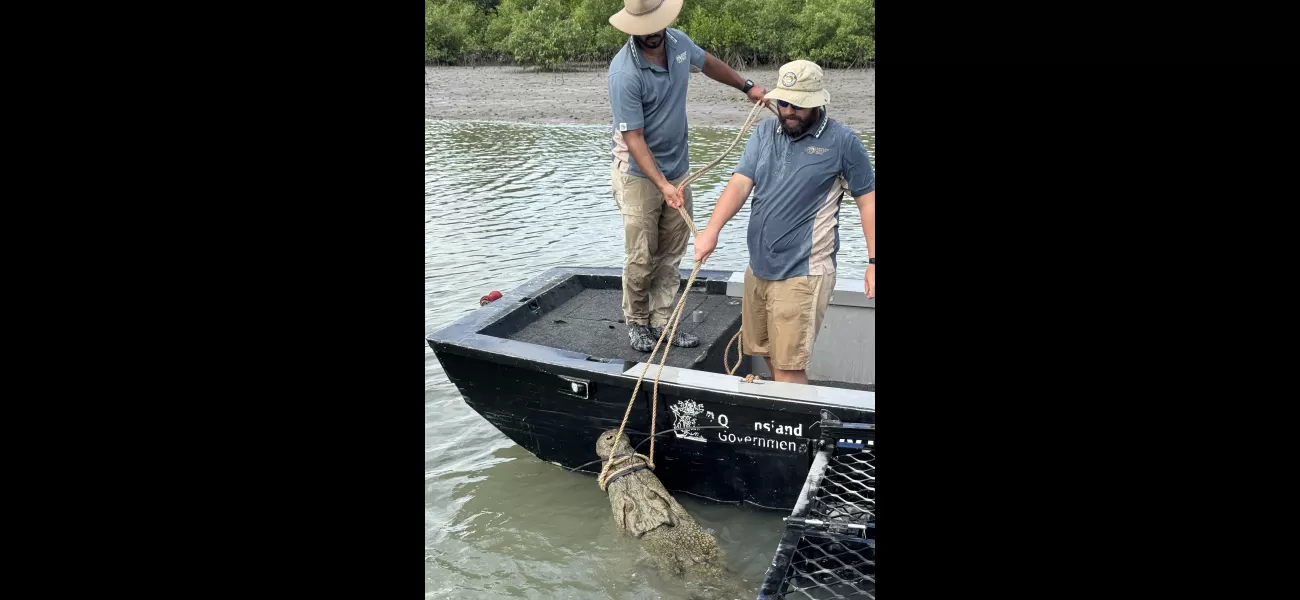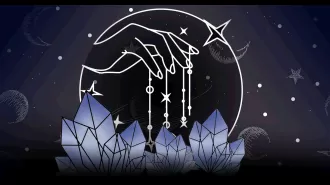Officials in Queensland successfully capture a large and aggressive crocodile.
Crocodile captured in Queensland after aggressive display near boats.
May 14th 2024.

Recently, a rather large crocodile was captured in Queensland by wildlife authorities. This was after the creature had been showing signs of aggression towards residents and even lunged at them while they were out on their boats. Luckily, the animal was safely captured in a baited trap at Cardwell Marina just yesterday. Interestingly enough, this was not the first crocodile to be caught in the same location in less than a week. It seems like these reptiles are quite fond of this particular spot.
According to Ella Meeve, a wildlife officer from the Department of Environment, Science, and Innovation, this crocodile is considered an "icon crocodile" under the state's conservation laws due to its impressive length of over four meters. This means that any decisions regarding its placement and housing must be made in consultation with the relevant traditional owners. In addition, the animal can only be placed in a registered crocodile farm or zoo that agrees to use it for educational purposes regarding crocodile conservation and their ecology.
These recent crocodile captures have sparked a renewed warning for residents to be cautious and "croc-safe." Meeve urges everyone who uses the marina to make sensible choices around the water, including properly disposing of any unwanted bait and fish frames. It is believed that the crocodiles were attracted to the marina due to the scent of baited crab pots or being fed by people discarding fish frames in the area. Wildlife officers were able to provide Crocwise information to residents of the marina while retrieving the trap, and their cooperation is greatly appreciated.
Meeve reiterates the importance of properly disposing of bait and fish frames in Croc Country, stressing that they must not be left above the low tide mark. As for the four-meter crocodile, it will be temporarily housed at a DESI holding facility while authorities consult with traditional owners. Remember, if you spot a crocodile, you can report it by using the QWildlife app, completing a sighting report on the DESI website, or calling 1300 130 372. Let's all do our part in keeping both humans and crocodiles safe in their natural habitats.
According to Ella Meeve, a wildlife officer from the Department of Environment, Science, and Innovation, this crocodile is considered an "icon crocodile" under the state's conservation laws due to its impressive length of over four meters. This means that any decisions regarding its placement and housing must be made in consultation with the relevant traditional owners. In addition, the animal can only be placed in a registered crocodile farm or zoo that agrees to use it for educational purposes regarding crocodile conservation and their ecology.
These recent crocodile captures have sparked a renewed warning for residents to be cautious and "croc-safe." Meeve urges everyone who uses the marina to make sensible choices around the water, including properly disposing of any unwanted bait and fish frames. It is believed that the crocodiles were attracted to the marina due to the scent of baited crab pots or being fed by people discarding fish frames in the area. Wildlife officers were able to provide Crocwise information to residents of the marina while retrieving the trap, and their cooperation is greatly appreciated.
Meeve reiterates the importance of properly disposing of bait and fish frames in Croc Country, stressing that they must not be left above the low tide mark. As for the four-meter crocodile, it will be temporarily housed at a DESI holding facility while authorities consult with traditional owners. Remember, if you spot a crocodile, you can report it by using the QWildlife app, completing a sighting report on the DESI website, or calling 1300 130 372. Let's all do our part in keeping both humans and crocodiles safe in their natural habitats.
[This article has been trending online recently and has been generated with AI. Your feed is customized.]
[Generative AI is experimental.]
0
0
Submit Comment





